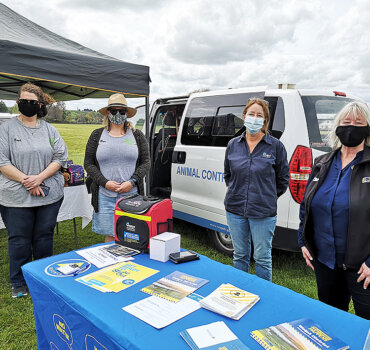
Recycling information l-r Sally Fraser, Shelley Wilson, Helen McLean and Cathie Shaw at a recent Kihikihi information day

Recycling information l-r Sally Fraser, Shelley Wilson, Helen McLean and Cathie Shaw at a recent Kihikihi information day
Putting recycling bins in public places is a “very expensive way to get low value recycling”, says the woman responsible for Waipā District Council’s waste minimisation.
Sally Fraser was responding to a suggestion by Cr Philip Coles at this week’s Service Delivery committee for more recycling options in Cambridge and Te Awamutu.
Fraser provided a report on the council’s submission to the Ministry for the Environment on Taking Responsibility for our Waste, a national waste strategy.
In the report she said the council supported engaging with producers, manufacturers and retailers so they could take more responsibility for their products or packaging.
Council’s research into public recycling bins showed they were inefficient at collecting recycling and were typically contaminated, said Fraser in response to Coles’ suggestion.
They become public rubbish bins and so it was better to save the high costs of servicing, sorting and landfilling for the very small volumes of good recyclable materials and simply add more rubbish bins, she said.
“The value of recycling from street bins is very poor.
“We remind our community recycling has to be clean, but they can’t wipe out the sushi container on the streets.”
Queenstown and Wellington had recently removed their recycling bins for that reason, said Fraser.
The current national waste minimisation strategy leaves councils and ratepayers trying to responsibly handle all waste at their cost, she said in the report.
“Most New Zealanders know it is wrong to drop a lolly wrapper or an ice-cream wrapper (little litter), so why is it still a problem? These reasons need to be better understood to inform any future education or communication work. This could be similar to the level of understanding Waka Kotahi/NZTA sought on what makes an effective road safety advertisement.
“For Waipā larger scale illegal dumping, and illegal waste sites, is of much more concern, cost and risk to the environment than little litter,” she said.
The two require totally different enforcement and education methods.
“There is a difference in terms of motivations, behaviour and enforcement between “little litter”, such as cigarette butts and food wrappers, and illegal dumping, such as mattresses, large bags of rubbish, rubble etc. The distinction and targets for these should be made,” said Fraser.
Cr Susan O’Regan said the report showed waste minimisation was an “educative thing” and how important it was to be a “tidy Kiwi.”
Having skilled council staff in the waste area was critical.
“We’d get a lot more progress if we had more Sallys (like you),” said O’Regan.








